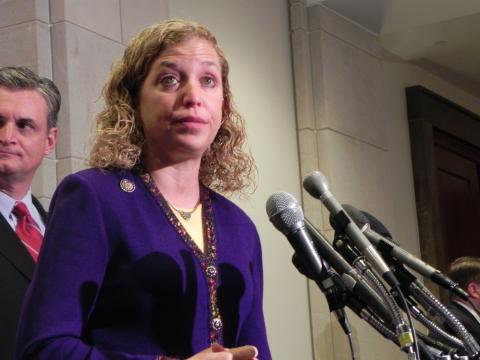Rep. Debbie Wasserman Schultz inserted two amendments into a 2018 appropriations bill last week aimed at stripping White House senior adviser Jared Kushner of his security clearance.
The amendments were Wasserman Schultz's response to the controversy over revelations that Kushner was involved in a June 2016 meeting between Donald Trump Jr. and a Russian lawyer in Trump Tower. Critics say the meeting was inappropriate and possibly illegal.
In comments about the amendments, Wasserman Schultz referred to Russia as "an enemy state."
The text of the first amendment reads:
"None of the funds made available in this Act may be used to issue, renew, or maintain a security clearance for any individual in a position in the Executive Office of the President who is under a criminal investigation by a federal law enforcement agency for aiding a foreign government."
The second references Kushner's revised security clearance form that includes a number of contacts with foreign nationals that he failed to disclose:
"None of the funds made available in this Act may be used to issue, renew, or maintain a security clearance for any individual in a position in the Executive Office of the President who deliberately fails, as determined by the issuing department or agency, to disclose in the Standard Form 86 of such individual a meeting with a foreign national if such disclosure is required for such form."
With the inclusion of these amendments (which were voted down in committee last Thursday), the Florida representative appears to be taking great pains to protect sensitive classified information from falling into the wrong hands.
Rep. Wasserman Schultz's own office, however, continues to employ a House IT staffer and personal friend after revelations in February that he was under criminal investigation by Capitol Police for allegedly breaching the House network and sending potentially sensitive congressional data offsite.
When it comes to taking information security seriously, there are many troubling and unanswered questions about Wasserman Schultz's own office.
In what looks like a shakedown from the outside, the staffer, Imran Awan, and four family members reportedly received millions of dollars in payments on the payrolls of over 20 House members over five years for mostly no-show, "ghost job" positions, while being granted access to House email servers for each of these representatives.
One of the Imran's brothers, Abid Awan, had a criminal record, a recent bankruptcy, an active lawsuit involving fraud in a car dealership he was managing, and $100,000 in payments from an Iraqi politician who is on the run from the U.S. Department of Justice. Yet Wasserman Schultz and other House members signed off on his server access.
One of these members was Rep. Ted Lieu (D-Calif.), who reportedly continued paying Abid into March, more than a month after learning Awan was under investigation. Lieu has criticized the Trump administration for endangering national security by not taking cyber security more seriously.
The party continues to polish Debbie Wasserman Schultz's image, despite her resignation as DNC chair for her role in marginalizing Bernie Sanders' presidential campaign in favor of Hillary Clinton.
House Minority Leader Nancy Pelosi continues to allow the Florida congresswoman to serve as a spokesperson for Democrats on a national platform, making frequent appearances on cable news to speak for Democrats.
In May, when Greg Gianforte won the Montana special election the day after body slamming a reporter for asking a question at a campaign picnic, I asked, "What Would Greg Gianforte Have to Do for The GOP to Disown Him?"
In that article I challenged voters to think:
"What on earth does it take to disqualify someone from being a person we would want to have more power than they already do, any role of leadership and prestige, any say in how our society should be organized?"
I criticized Republican Party leaders like Speaker Paul Ryan for their unabashed partisanship in standing behind Gianforte.
The leadership vacuum is just as pronounced across party lines.
The fiasco over the 2016 Democratic presidential nomination and the unfolding criminal investigation into Wasserman Schultz's office for breaching House security begs the same question: What would Debbie Wasserman Schultz have to do for the Democratic Party to disown her?
When will partisanship make way for a good faith effort at responsible and ethical governance?
